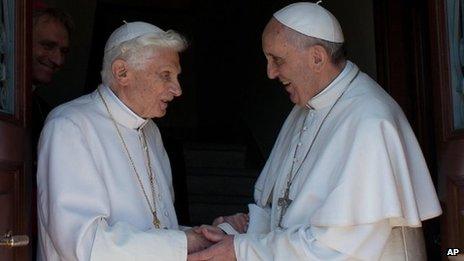Ex-Pope Benedict returns to Vatican
- Published

Former Pope Benedict has returned to the Vatican, two months after becoming the first pontiff to resign in 600 years.
He was flown by helicopter from the Castel Gandolfo papal summer residence to live permanently in Vatican City.
Greeted by Pope Francis as he arrived, he was driven the short distance to his new accommodation.
Benedict, 86, was last seen in public on 23 March and there has been speculation about his health.
Observers said at the time he appeared more frail than when he stepped down on 28 February.
However, Vatican spokesman Federico Lombardi said this week that Emeritus Pope Benedict was not ill.
Hours after his arrival, the Vatican issued a photograph of Benedict shaking hands with Pope Francis. However, unlike his departure from the Vatican, there was no live TV coverage of his return.
'Hidden from the world'
Benedict will live in the converted Mater Ecclesiae convent just behind St Peter's Basilica, with his personal secretary, Georg Gaenswein.
The building, described as "small but well equipped" by Fr Lombardi, includes an attached chapel, a library and a study.
There is also a guest room available for when his older brother, Georg Ratzinger, visits.
The Vatican said Pope Francis welcomed Benedict "with great and fraternal cordiality".
The two then held a "brief moment of prayer" in Benedict's chapel.
Benedict will now dedicate himself to a life of private prayer in the service of the Church, according to the Vatican.
His arrival heralds an unprecedented era of a former pope living close to his successor at the Vatican.
But at the time of his abdication, Benedict suggested he would not try influence his successor, saying he would live out the rest of his days "hidden from the world".
At a meeting in March with Pope Francis, he also repeated "unconditional reverence and obedience" to his successor.
When he resigned, Benedict cited his advanced age as the reason, saying he no longer had the strength for "an adequate exercise of the Petrine ministry".